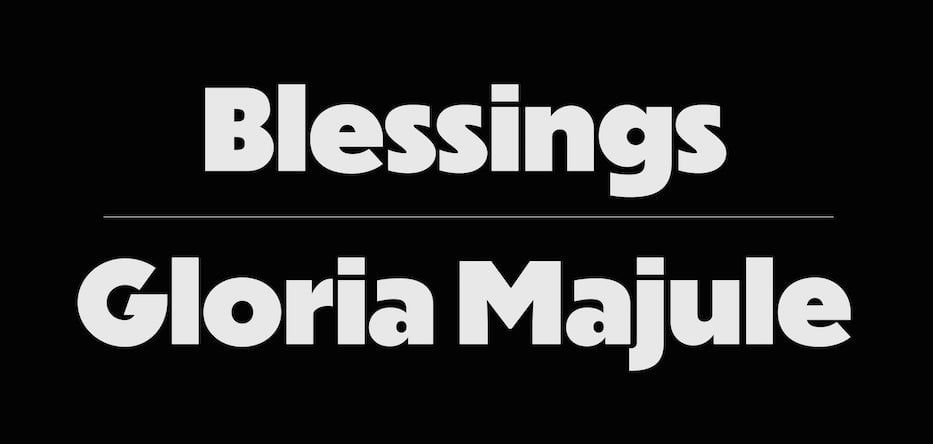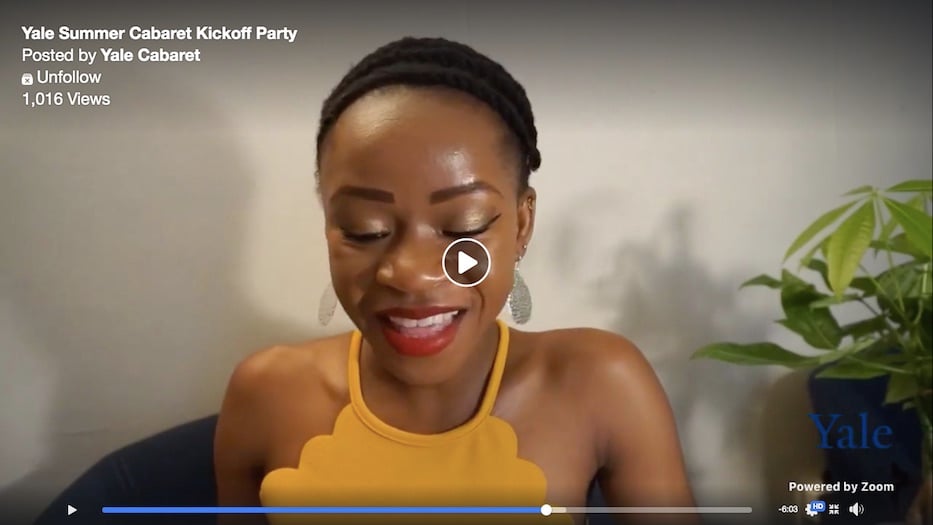
Image from the Yale Summer Cabaret.
Mama and Rebeka stand in the living room filled with boxes. Rebeka, who is in her last trimester of pregnancy, asks Mama if she wants to join the protests outside the courthouse. Mama refuses. It has been six months since Officer Sans killed her son, Baraka. Rebeka insists that the protests are necessary.
“How do you fight not guilty?” Mama asks. “I am done protesting.”
The next morning comes and none of the boxes have been moved.
Friday marked the live reading of Gloria Majule’s Blessings, the final work of the Yale Summer Cabaret’s season. Co-artistic director Alex Keegan directed the reading, held online due to COVID-19. Instead of seeing Zoom as a limiting factor, the team tapped into virtual performances to inform what a liberated theatre could be.
This year, the season was dedicated to Black womxn playwrights and presented entirely online. Its theme, “Meza,” comes from the Swahili word for table. Prior works included a.k. payne’s Where Pathways Meet and Angie Bridgette Jones’ Daughters of the Confederacy.
Blessings is a dive into the aftermath of police brutality and the Black women who drive the movement against it. The play focuses on unlikely relationships formed by proximity and affinity. Mama (Alexandra Maurice) dislikes Rebeka (Tavia Hunt) and never approved of her relationship with her son Baraka. But in the aftermath of Baraka’s murder at the hands of police, they are forced to live together.
Despite the constant bickering, they share intimate moments, such as ruminating on potential baby names. After many failed attempts to please Mama, Rebeka asks what the word for hope is in Swahili, Mama’s mother tongue. She wants to assure herself that there will be Black people in the future. Tumaini, Mama responds.
Hope and peace are challenged continuously through the play as Detective Laurent—a third Black woman, played by Maal Imani West, visits the house on multiple occasions to question both of them. Officer Sans has been killed, and they are both suspects.

| Playwright Gloria Majule earlier this summer, at a kickoff party for the Yale Summer Cabaret. |
Mama comments on the absurdity of the department sending a Black female detective to question two Black women. Lauren is equally aware of the tension and expresses a desire to clear the women's names, but is met with apprehension.
Majule shows a keen eye to the everyday conversations and relationship building that comes in the aftermath of a death. In these conversations, the women often display grace towards one another and even the people behind their pain.
As Majule wrote in the digital play bill: “It’s the grace Black women have to not burn down the world but instead burn a candle. It’s a grace that Black women share with those who are least deserving to even know our names. It’s a grace that moves Black women to be victor instead of victim.”
In the closing act, Mama refuses to be graceful anymore. She kills Officer Sans at 3:54 a.m. after going to church. Afterwards, Laurent arrives to inform the two women that Mama was caught on tape. Instead of arresting Mama, she helps them flee.
“Have you ever hated someone so much you wanted them to feel so much pain,” Mama confesses to Rebeka. “No matter what I did, the anger kept growing in me.”
In a talkback session moderated by Ashley Thomas and Faith Zamblé, cast members from all three of the season’s plays discussed the limitations and opportunities presented by virtual performances. The Yale Center for the Study of Race, Indigeneity, and Transnational Migration (RITM) sent in questions about the material limitations of Zoom and how the most recent events surrounding the Black Lives Matter movement and state-sanctioned murders of Black people have shaped the material.
“Being in a cast that was made up almost entirely of Black womxn was a grounding experience,” said Hunt. “We were all sort of on the same page.”
Playwright a.k. payne, who opened the season with Where Pathways Meet, highlighted how the most recent events are part of a continuous struggle for Black liberation.
“Black lives have always been a target,” she said. “The work is not new.”
Hunt spoke further about the difficulties of lacking a live audience and having to rethink the live-audience theatre format as a performer. In a live setting, audience reactions affirm the performer’s work. Here, she had to think about her practice entirely differently.
“It [virtual theatre] has made me reaffirm and connect with my personal process,” she said. “I am not relying on validation from people laughing. I know I said something funny.”
Maurice echoed the sentiment of rethinking the process and often returning to the basics with each performance especially the relationship between performer and playwright.
“It is an incredible act of faith and trust,” she said. “All we have is the playwright's words.”
Abigail Onwunali, who played Minnie in payne’s Where Pathways Meet, said she believed the shift to virtual theatre will lead to a new rise of independent theatre less attached to traditional structures.
“There are no excuses to not make a play,” she said. “If you decide tomorrow to start writing your heart out, you can have your mom be an actor and it will work.”
With the rise of independent theatre productions, co-artistic director Christopher Betts and payne said they both believed this was an opportunity to create Black art for a less white audience and eliminate the need to explain or legitimize Blackness for white audiences.
Betts added that an online, free model can uplift Black voices without monetization. It can challenge traditional white institutions, which profit off Blackness and often cater to majority-white audiences.
“Capitalism manipulates our stories and forces us to perform for white audience,” payne said. “How to undo form and find our own structures that have been silenced and effaced from us through colonial history.”
Find out more about the Yale Summer Cabaret on Facebook or at its website.